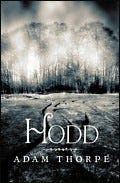A bleak vision of a brutal medieval underworld, Hodd is Robin Hood as you’ve never seen him: a sadistic wolfshead who little resembles the philanthropic, romantic folk-hero of modern convention. Thorpe’s Robert Hodd, inspired by the fifteenth century ballad “Robin and the Monk”, is a delusional but charismatic felon whose subversive and amoral quasi-religious philosophy attracts an eager following of sycophantic cut-throats.
The story is recounted by an elderly monk recalling his time as a fourteen-year-old prisoner of Hodd and his far-from-merry men. A talented minstrel, his life is spared when he delights his captors by composing and singing a ballad glorifying Hodd. It spreads the outlaw leader’s false fame like wildfire. The orphaned youth, raised by men of God, finds Hodd’s blasphemous claims no less horrifying than his casual cruelty: “We can throw God away as the snake discards his skin. Then we fear nothing, because there is no sin”. Proclaimed one of the Chosen “free spirits” and given the name Moche (Much), the boy becomes a member of the band of robbers and takes part in acts which will haunt him for the rest of his days.
Thorpe's use of language masterfully evokes an authentic historical voice. The monk’s manuscript comes complete with a scattering of Middle English words and names spelt with typical variability, as well as marginalia, interpolations, footnotes and comments from the "translator", which lend the book a spurious scholarly conviction.
As it highlights the harshness of life for the common man in thirteenth-century England, Hodd shows how readily the timely and stirring image of a defiant outlaw might have met popular discontent to create the enduring legend of a people's champion. In the process it offers a sly comment on the ironic truth that undoubtedly lies behind many a myth. (2009, 336 pages)



